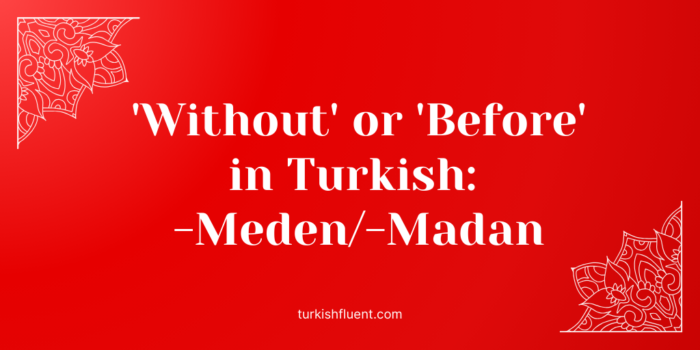In Turkish, the suffix -meden / -madan is used to express actions that happen without doing something or before doing something else. This suffix attaches to the verb root and does not change based on tense or subject.
The choice between -meden and -madan depends on vowel harmony:
- -meden follows verbs with front vowels (e, i, ö, ü).
- -madan follows verbs with back vowels (a, ı, o, u).
Let’s explore these two meanings with examples.
Expressing “without” with -madan / -meden
The most common use of -madan / -meden is to say that an action happens without another action being completed.
[First action verb] + -madan / -meden + [Main action]
| Verb | Without doing (Turkish) | Meaning (English) |
|---|---|---|
| gitmek (to go) | gitmeden | without going |
| konuşmak (to speak) | konuşmadan | without speaking |
| içmek (to drink) | içmeden | without drinking |
| görmek (to see) | görmeden | without seeing |
Examples:
- Saçını kurutmadan dışarı çıkmış ve hasta olmuş. (She/He went out without drying their hair and got sick.)
- Bana sormadan nasıl böyle bir şey yaparsın? (How can you do something like this without asking me?)
- Meyveleri yıkamadan yemeyin. (Don’t eat the fruits without washing them.)
- Eiffel Kulesi’ni görmeden Paris’ten ayrılamam. (I can’t leave Paris without seeing the Eiffel Tower.)
- O tam bir bağımlı. Instagram’a bakmadan duramıyor. (He/She is a complete addict. They can’t go without checking Instagram.)
Negative Form:
To express “without not doing something”, use the negative verb root before -meden / -madan.
| Verb | Without NOT doing (Turkish) | Meaning (English) |
|---|---|---|
| gitmemek (not to go) | gitmemeden | without not going |
| konuşmamak (not to speak) | konuşmamadan | without not speaking |
| içmemek (not to drink) | içmemeden | without not drinking |
Example:
- O gün gülümsememeden geçti. (That day passed without me not smiling.)
Expressing “before” with -madan / -meden
Besides meaning “without”, -madan / -meden can also indicate that one action happens before another:
[First action verb] + -madan / -meden + Main action (+ optional “önce”)
Note that adding “önce” is optional here. Using it makes the meaning more explicit, but it’s not required.
Examples:
- Dışarı çıkmadan montunu giy. (Put on your coat before going out.)
- Uyumadan dişlerini fırçala. (Brush your teeth before sleeping.)
- Gitmeden önce bana haber ver. (Let me know before you leave.)
- Ödevimi bitirmeden önce oyun oynayamam. (I can’t play games before finishing my homework.)
That’s all for “before” and “without” in Turkish! If you want to express “after something,” there is another suffix: discover how to Express “before…” and “after…” in Turkish with -dan / -madan / -dıktan.
